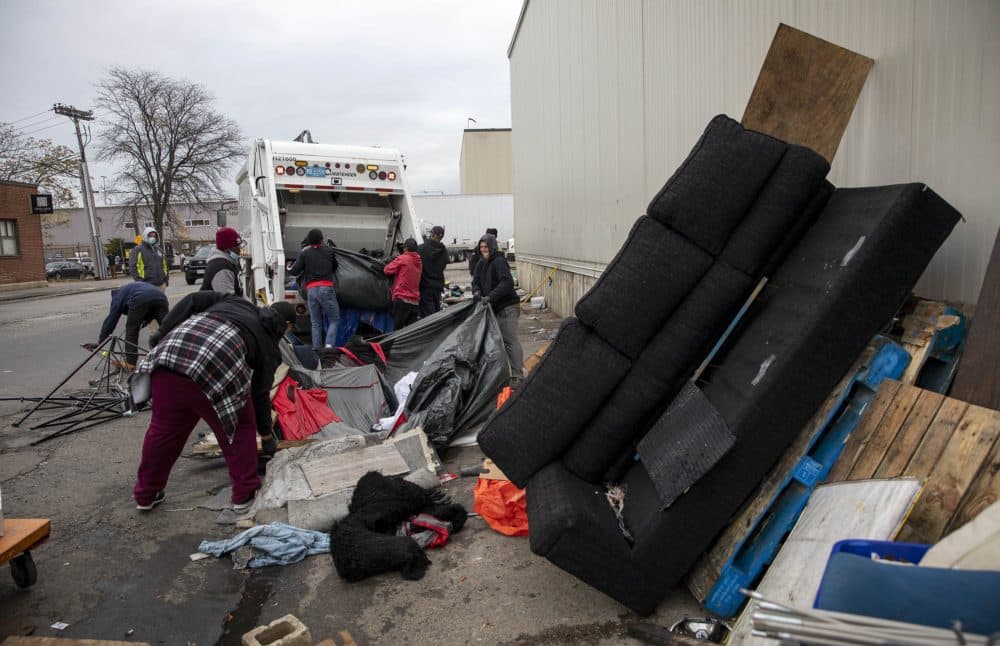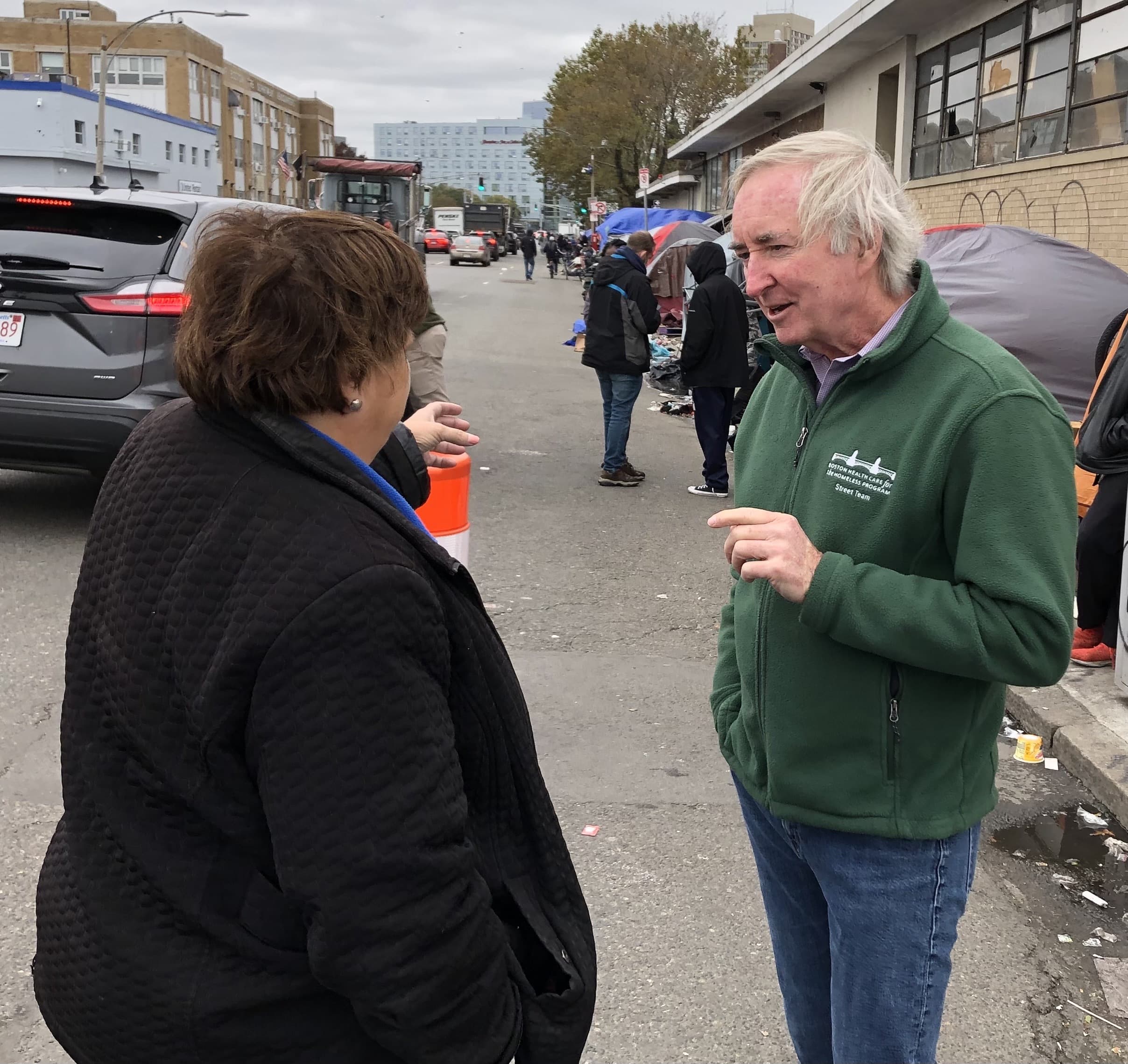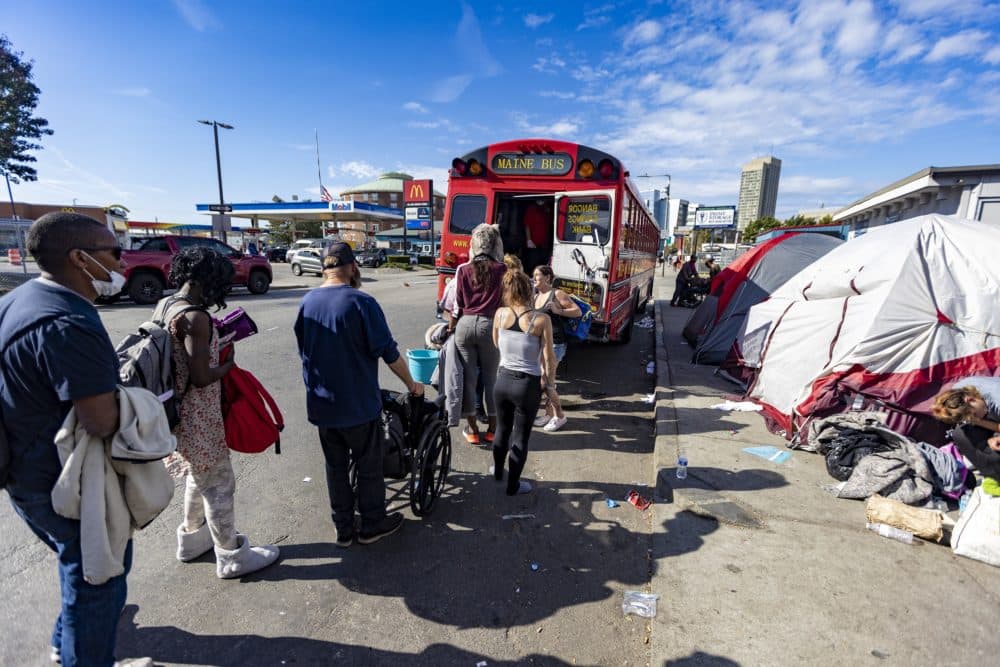Advertisement
This doctor has spent decades treating Boston's homeless population and says city's tent crisis is worst he's seen
ResumeThe intersection of Massachusetts Avenue and Melnea Cass Boulevard in Boston — or "Mass. and Cass," as its come to be known in the opioid epidemic — is pretty quiet despite its reputation as an open air drug market and homeless encampment. There's the normal buzz of cars and pedestrians, some walking to services at area homeless shelters and clinics.
But half a mile southeast, in Newmarket Square, is where the picture changes dramatically. Camping tents line the sidewalks near the public homeless shelter for men on Southampton Street. One tent has the words "Hated by Many — Loved by None" scrawled on it. Sidewalks are strewn with garbage, wet clothing and discarded needles. People gather and roam. Many openly use drugs.

City officials in Boston said Friday that people living in the tents will be given at least 48 hours' notice that they have to leave before their tents are cleared. Outreach workers are telling them where they can get beds in shelters or housing and drug programs — if they want them.
It's all part of an executive order Acting Mayor Kim Janey announced last week. She declared a public health crisis in the area.
'A Struggle To Stay Clean Out Here'
A woman sweeps the street outside the tent where she says she's been staying with a friend. He's inside throwing all their belongings out onto the sidewalk.
She says her name is Crystal. She won't give her last name. She's 45 years old. Outreach workers from Pine Street Inn and Boston police just came and talked with her. She told them she recently found out she's pregnant, and because of that, she wants to go to a family shelter.
"I mean, I don't need a treatment program. So I don't need to go there," Crystal says, adding that she's getting treatment at a methadone clinic. She says she isn't using drugs right now.
"It's a struggle to stay clean out here," she says.
Dr. Jim O'Connell has taken care of people in Crystal's situation for 36 years. As president and founding physician of Boston Health Care for the Homeless Program, he was one of the first to bring medical care to people experiencing homelessness, where they were: on the streets, or in shelters.
And still, after all he's witnessed, the scene at the massive tent encampment hits him.
"To witness just the human misery and suffering here is kind of breathtaking and so discouraging in many ways," O'Connell says. He recalls how he "learned the streets" by riding on the Pine Street Inn outreach van, getting to know people during those long nights. Over the last four to five years, he says, there are more people on the streets that he and his team don't know and haven't yet been able to engage. The surge in street homelessness near "Mass. and Cass" has been extremely difficult to address, he says.
"It's something I would never have imagined. I've seen it in other cities, so I know this is not unique in any way, shape or form," O'Connell says. "But it is such a challenge to all of us working with these folks. And there are no easy solutions."
It's something he says he wouldn't have envisioned here because Boston has sheltered most of its homeless population, unlike many other big cities — 97% to 98% have been sheltered in recent years. When the last homeless census was done early this year — in the middle of the pandemic — there were 170 people sleeping on the streets of Boston. Now, O'Connell says, there are a few hundred in the tent encampment alone.

He cites a series of events as factors that have led to more desperation and more people living on the streets. In 2014, the city closed the shelter and drug treatment programs on Long Island, when the bridge to the island was deemed a hazard. The city then opened the men's shelter on Southampton Street. The opioid epidemic was hitting at the same time. Then, a few years later, O'Connell says, meth exploded onto the scene.
"Now it's this cocktail of different medications and drugs, including methamphetamine, and it's made behavior be much more unpredictable for folks," he says.
The coronavirus pandemic led to more housing and food instability — and drug use. And more people have been drawn to the troubled South End area, where there is both help and harm. There are many shelters and drop-in centers where people can get connected with services, but also a free-flowing, open-air drug market.
An HIV Outbreak
O'Connell says the Boston Health Care for the Homeless teams are delivering medical care to people in the tent encampment and other outdoor locations around the city every day, including during this week's nor'easter. They're spending a lot of time responding to a recent HIV outbreak in the camp. O'Connell says there have been about 50 new infections in recent months.
"And these are young people who are struggling with so many other problems," he says. "And to add HIV onto it is quite, you know, quite extraordinary."
The medical teams distribute HIV treatment, as well as the medication known as PrEP, which prevents HIV transmission.
"As you start to care for these folks, as you stop seeing them as a bunch of people in a tent and see them as individuals who have been through some version of their own hell ... you can't leave them."
O'Connell says it's hard to engage people who are dealing with many co-occurring medical conditions, addictions and mental illnesses.
"As we learned years ago on the van, it takes time to get people who are really scarred by the system and suffering from many, many stigmata — put it that way — of what they're going through."
A young man approaches and says he's a heroin user. He's clearly under the influence. He says he just got "kicked out" of a detox program — and it usually takes about three detoxes to get him sober. Dr. O'Connell asks him how much heroin he's using. He says 60 milligrams.
"Sixty, huh?" O'Connell says to him. "That takes a long time to come off. That's really painful ... ."
The young man says he doesn't have a tent out here. He doesn't want to get comfortable with this way of life — even though he's been out here three years.
O'Connell says most people tell him they don't choose to be out here on the street. They're choosing to not be somewhere else. Some people struggle to be in large crowds in shelters. Or they want to be able to stay with a partner. Or they've experienced something bad in a shelter or other living situation.
"And then others, to be very honest with you, may not be able to go inside and abide by the rules," O'Connell says. "They may need to be using [drugs] every four hours, but they can't stay in for eight hours. So they're out here because they're trying to keep themselves from getting sick."
Asked why he and his team keep coming back, caring for people on the streets at the lowest points of their lives, O'Connell says it's the connection they develop.

"As you start to care for these folks, as you stop seeing them as a bunch of people in a tent and see them as individuals who have been through some version of their own hell, their stories become compelling and you can't leave them," he reflects. "I watch our staff, who are emotionally exhausted from COVID and everything else, but they are attached to these folks, and they're not going to go away."
Crystal says she hopes she can get far away. She doesn't want to go to a shelter in this area of the city. She wants a fresh start. But for now, she hides in her tent when she can, so she isn't tempted by others using drugs.
About 15 feet behind her, a very young woman looks dazed, disheveled and unsteady. She bends over, studying her exposed legs, which are covered with large sores — a needle in her hand.
This segment aired on October 29, 2021.
